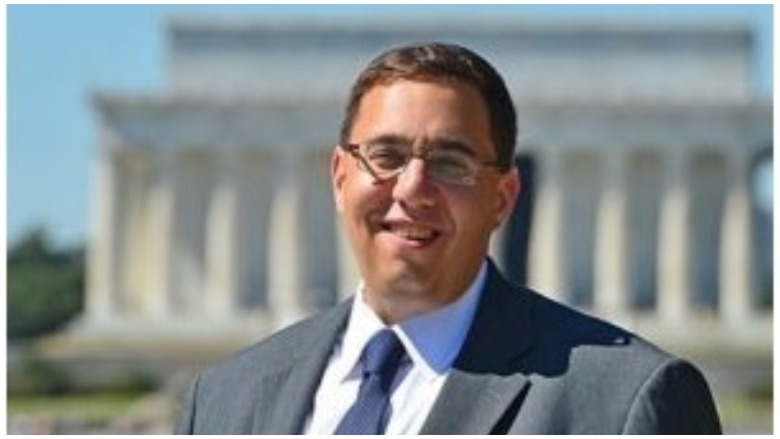
William Consovoy
William Consovoy is a partner at the law firm Consovoy McCarthy Park PLLC. Since March 2018, the firm has been representing President Trump as Trump faces a federal lawsuit over his undivested business interests. Consovoy has been acting as the president’s personal lawyer. On April 5, Consovoy sent a letter to the Treasury Department, arguing that the House Ways and Means Committee has no “legitimate committee purpose” for requesting the president’s income tax returns. Consovoy requests that forcing the president to hand over his income tax returns would set a “dangerous precedent.” Here’s what you need to know:
1. Consovoy Said Democrats Were Using the Tax Return Issue as a Way to ‘Intimidate’ & ‘Harass’ their Political Enemies
Earlier this week, Democrats in the House formally requested the past six years of the president’s income tax returns. Democrats say that the request had nothing to do with politics. But Consovoy, who said the president would not be handing over his tax information, said the request amounted to an “abuse of power.” He wrote,
“It would be a gross abuse of power for the majority party to use tax returns as a weapon to attack, harass and intimidate their political opponents. Once this Pandora’s box is opened, the ensuing tit-for-tat will do lasting damage to our nation.”
2. Consovoy Represented the Plaintiffs in a Recent Affirmative Action Case Against Harvard
Consovoy represented the nonprofit group Students for Fair Admissions Inc in a lawsuit filed against the president of Harvard University. The lawsuit charged that Harvard had violated the Civil Rights Act by discriminating against Asian Americans in their admissions policy. The plaintiffs were backed by the Department of Justice and also by the Federalist Society. Harvard was backed by the American Civil Liberties Union and other groups. The university claimed that it had a right to take race into consideration as part of its admissions policy, since, it argued, providing a diverse environment benefited all its students.
<hr.
3. Consovoy’s Firm Represented ‘Speech First,’ a Group Fighting What They Called ‘Restrictions on Free Speech’ on College Campuses
Consovoy’s law firm represented a group called “Speech First,” a non-profit organization that filed a lawsuit last year against the University of Michigan. Speech First charged that the university’s anti-harassment rules violated free speech and freedom of expression. The group also charged that the University of Michigan’s “Bias Response Team” — a campus group which investigates bias complaints — had overstepped and was making it difficult for many members of Speech First to express themselves. The group wrote, in a press release last year:
“In light of these policies, Speech First members enrolled at Michigan have abstained from speaking on topics including immigration, identity politics, and abortion because they fear their speech will be anonymously reported as offensive, biased, and/or hateful to university authorities through the bias response system. The complaint alleges that these hopelessly vague policies chill student speech and expression – a clear First Amendment violation.”
4. Consovoy Specializes in Constitutional Law & Once Clerked for Clarence Thomas
Consovoy specializes in constitutional law and federal law. He’s argued several cases before the Supreme Court, including argued Spokeo v. Robbins and Evenwel v. Abbott—before the Supreme Court of the United States.
Consovoy served as a law clerk to Supreme Court Justice Clarence Thomas, and also clerked for Judge Edith H. Jones of the United States Court of Appeals for the Fifth Circuit of Virginia. Consovoy has won a number of accolades for his work; he’s been named a “rising star” by Law 360 and has been ranked one of the leading appellate lawyers in the nation by Chambers and Partners.
5. Consovoy Represented the Plaintiff in a Case that Led to Provisions of the Voting Rights Act Being Struck Down
In 2013, Consovoy was a member of the legal team that challenged the constitutionality of some provisions of the Voting Rights Act. In the case of Shelby County vs Holder, officials in Shelby County filed a lawsuit asking a federal court to declare Section 5 of the Voting Rights Act unconstitutional. Section 5 requires certain voting districts — the districts with a history of discrimination — to formally submit any changes in voting procedures to the U.S. Department of Justice or to a federal district court before the change went into effect. The idea was to make sure that the proposed change would not harm minority voters.
The case was argued all the way to the Supreme Court, which eventually struck down the provision.
Consovoy teaches occasional classes at the Antonin Scalia Law School at George Mason Univerisity, where he is a co-director of the Administrative Law Clinic and the Supreme Court Clinic. He is also a frequent speaker at the Federalist Society.
Mr. Consovoy earned his B.A. from Monmouth University, and his law degree from George Mason University School of Law.